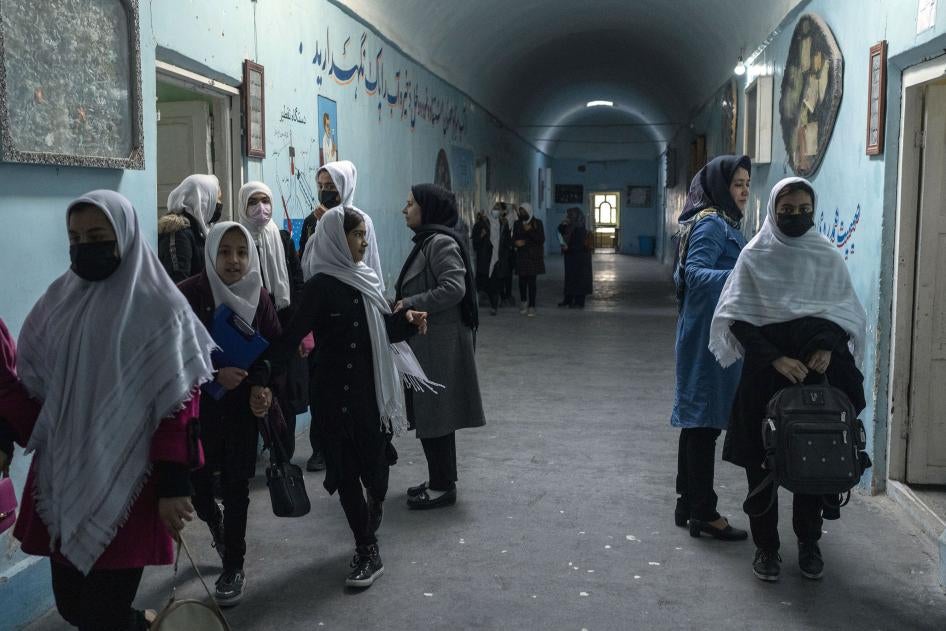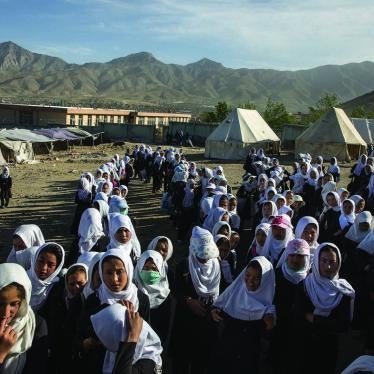(New York) – The Taliban’s pledge to allow all girls’ secondary schools in Afghanistan to reopen on March 23, 2022, needs careful monitoring, Human Rights Watch said today. Aziz Ahmad Rayan, an Afghan education ministry spokesman, told the media on March 17 that, “All schools are going to open to all boys and girls.”
Since taking power on August 15, 2021, the Taliban have broadly violated the rights of girls and women. They ordered the reopening of boys’ secondary schools on September 18, but did not include girls’ schools. The vast majority of girls’ secondary schools have remained closed, depriving millions of adolescent girls access to education. The Taliban have also imposed harsh gender segregation and new rules about conduct and clothing for women attending universities, silenced protesters defending women’s rights, and censored the Afghan media, especially coverage of women’s rights.
“Taliban statements are often very different from Taliban actions,” said Heather Barr, associate women’s rights director at Human Rights Watch. “No one should believe that the Taliban has stopped blocking girls from secondary education until the evidence from the ground shows that to be the case.”
Donor governments, the United Nations, and others funding Afghanistan’s education system should closely track the following issues:
- Do the schools open everywhere and stay open? The Taliban know that reopening secondary schools is a high priority for donors from whom the Taliban seek financial assistance and recognition, and countries around the world have criticized the Taliban for denying girls access to education.
There is a risk that the incentive to look good could prompt the Taliban to highlight reopening of some schools, especially in urban areas, while leaving schools shuttered in rural areas, where girls experience acute barriers to accessing education. The Taliban should ensure that all schools teaching girls remain open to them throughout the school year and that adequate resources, especially for teachers, are allocated to all girls’ schools across the country.
- Are there enough teachers? An unlocked school gate or building alone does not provide education. To function, teachers need to be present and able to do their work. Afghanistan has a longstanding shortage of women teachers, worsened by Taliban rules on gender segregation within schools, and flight from the country after the Taliban takeover.
In addition, most teachers in Afghanistan have gone months without their salaries, in large part because donors had cut off assistance to Afghanistan’s deeply aid-dependent services after the Taliban takeover. Donors should swiftly work to ensure that teachers are paid in areas where education is being provided on an equal basis to girls and boys. The Taliban should fully cooperate in this effort.
- Are the Taliban harassing students and teachers? Students and teachers in a number of provinces have described heavy-handed and fear-inducing Taliban measures to enforce new rules they have imposed regarding the dress and conduct of women and girls, including frequent inspections of schools by abusive and heavily armed Taliban members. These abuses make it difficult for students to learn and for teachers to teach.
- Has the curriculum been changed? Taliban officials in several provinces have already revised the curriculum or said they plan to do so, removing secular subjects and replacing them with expanded religious study. Some school officials have been told that the changes will be carried out in March 2022 as the school year resumes.
- Do girls have incentives to study? The Taliban have banned women from most forms of paid employment, with the main exceptions being teaching girls and providing health care to women. Girls and their families have little incentive to make the major sacrifices often required for them to pursue and complete education when the career they dreamed of is off limits. The recent Taliban announcement that women will not be permitted to leave the country alone to study abroad is a further disincentive to study. The Taliban should remove all restrictions on women’s rights to work and travel.
Donors should look to the UN Assistance Mission in Afghanistan to help monitor the situation. On March 17, the mission received a new mandate including to “support and promote gender equality, women’s and girls’ empowerment, and the full protection of their human rights, including education.” Human Rights Watch outlined key concerns and recommendations for donors on access to education for girls and women in a recent report.
“The Taliban want international aid and recognition, and they are ready to make some compromises to get it,” Barr said. “Donors – many of whom spent the last 20 years promising to stand beside Afghan women forever – should closely monitor the right to education for girls and women and make it a priority to raise all violations of this right with the Taliban.”








